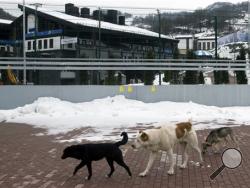Olympic city orders stray dogs killed
Posted: February 4, 2014 - 4:00am
SOCHI, Russia (AP) -- Thousands of stray dogs have been living amid the mud and rubble of Olympic construction sites, roaming the streets and snowy mountainsides, and begging for scraps of food.
But as the games drew near, authorities have turned to a company to catch and kill the animals so they don't bother Sochi's new visitors -- or even wander into an Olympic event.
Alexei Sorokin, director general of pest control firm Basya Services, told The Associated Press that his company had a contract to exterminate the animals throughout the Olympics, which open Friday.
Sorokin described his company as being involved in the "catching and disposing" of dogs, although he refused to specify how the dogs would be killed or say where they would take the carcasses.
The dogs have been causing numerous problems, Sorokin said Monday, including "biting children."
He said he was stunned last week when he attended a rehearsal for the opening ceremony and saw a stray dog walking in on the performers.
"A dog ran into the Fisht Stadium, we took it away," he said. "God forbid something like this happens at the actual opening ceremony. This will be a disgrace for the whole country."
The strays tend to gather near construction sites where they have gotten food and shelter from workers. Dogs have even been able to get inside the Olympic Park and accredited hotel complexes and villages, in the coastal cluster of arenas and venues up in the mountains.
A pack of at least a half-dozen healthy-looking dogs roamed around a loading zone of a gondola, 400 meters (1,200 feet) above the Gorki Plaza in the mountain venues for the Olympics as construction work continued late Sunday.
Olympic volunteers patted and cooed over strays that trotted into the park Monday. Another dog dropped to the ground, sunbathing under the Olympic Rings near a public site where medals will be presented to athletes during the games.
Animal activist Dina Filippova is among the opponents of the latest dog-culling plan, saying city authorities are using the Olympics as an excuse to cover an ongoing practice.
"We should understand that it is done not only before the Olympics but constantly," she told the AP in an interview in downtown Sochi, where she was trying to find homes for seven puppies she recently rescued near the Olympic Park. "Two killers from that company work for the city to kill 300 dogs a month."
"It is not humane," she added. "There is a humane way of solving the problem of stray dogs which is used in Europe and the United States and even in some countries of the former Soviet Union -- that is a mass sterilization which eventually leads to no stray dogs on the streets."
Sorokin's company operates in the Krasnodar region, which includes Sochi and the neighboring area. He refused to say how many dogs they kill a year, calling it a "commercial secret."
Sergei Krivonosov, a lawmaker from the Krasnodar region, last year supported the dog culling.
Krivonosov said taking the dogs off the street was Russia's "responsibility to the international community and that their elimination is the quickest way to solve this problem."
He conceded, however, that this is "not the most humane way" of dealing with the problem and that authorities should encourage dog shelters.
Sochi city hall last year announced a contract "to catch and dispose" of strays in Sochi -- a move that animal activists vehemently protested. Authorities pledged to give up the practice and build animal shelters for strays instead.
Activists say there is no evidence that a shelter has been built. But city hall said in a statement on its website that it had opened a dog shelter Monday for 100 dogs.
Shooting stray dogs has been common practice in many Russian regions despite activists' efforts to push for more humane ways to deal with the issue.
Nadine Kincaid, an Olympic volunteer from Portland, Oregon, was surprised by how many dogs are roaming around Sochi.
"There's a lot of dogs everywhere. Right behind where we're staying, there's a whole legion of dogs," she said. "I come from a town where there's leash laws and everyone has to pick up after their dogs, so that's unusual to me to see that."
Kincaid said she would be upset if the dogs were being poisoned.
"As an animal lover, for me that's sad. But if they're like stray cats, they can keep breeding and cause more problems. So I can see, maybe, why," she added. "It's sad, but what do you do if you can't control them?"

